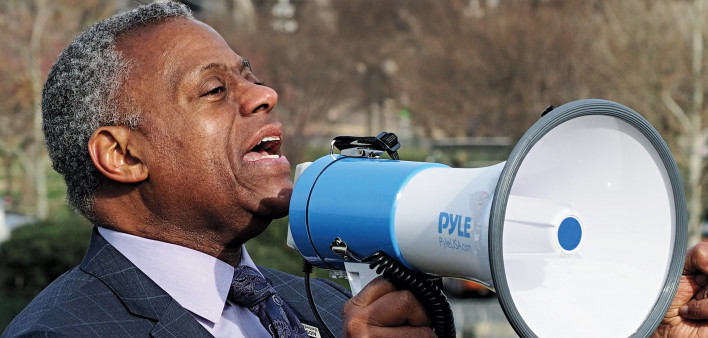On June 23, 2021, Jesse Milan Jr., AIDS United president and CEO, represented the HIV community among a group of the nation’s leading LGBTQ community leaders at a roundtable meeting with the U.S. Senate Democratic Steering and Outreach Committee. The purpose of this meeting was to discuss the challenges and legislative strategies that impact the rights of the LGBTQ community. A total of 16 senators and four organizations attended the informal meeting, with AIDS United the only HIV-specific group present.
Milan’s remarks were focused on the last 40 years of HIV, what is needed to end the epidemic and what lessons that the HIV sector had for tackling COVID-19. The remarks were well received by the senators and other community members present. The meeting was one of the first that this committee was able to attend together in person since COVID-19, making the atmosphere of the event exciting for all parties involved. This was a unique forum to speak with senators on issues that matter most to members of the LGBTQ community.
Read Milan’s remarks below.
Thank you.
This month is a milestone for the HIV community because on June 5, 1981 — 40 years ago — the CDC published its finding officially identifying the HIV virus. Since then, over 700,000 Americans have died of AIDS — a number almost identical to the number of people who have died as of this month from COVID-19.
So, we’ve been sharing throughout the last 15 months how the lessons from HIV are lessons for all of us in the COVID-19 pandemic. Lessons about teaching safe practices for prevention, about creating wide and intentional access to care including testing and treatment and lessons about stopping racial health disparities. Those lessons apply to COVID-19 and to HIV.
At AIDS United, our HIV policy agenda is driven by our hundreds of member organizations and grantees who work every day in your states to address the needs of the 1.2 million Americans living with HIV and the additional 1.2 million that the CDC tells us are highly vulnerable to HIV. Those living with and vulnerable to HIV include Black and Brown gay men, especially young gay men, transgender people, injection drug users, Black women and people in the South.
But our agenda begins with you. We need your support for creating the political will to end the HIV epidemic.
That political will begins with protecting policies that promote access to care. That includes maintaining and defending the Affordable Care Act, and that includes support for Medicaid and standing firm against Medicaid block grants, work requirements and lifetime care caps. Let us be clear, new HIV cases come primarily from states who have not expanded Medicaid. We must build political will in Congress and at home to end the Medicaid coverage gap.
The political will to end the HIV epidemic must include funding for PrEP, a once-daily pill that prevents HIV transmission. The PrEP Access and Coverage Act would provide new resources and strategies for greatly expanding access to PrEP especially in communities of color.
Greater access to care would help get the remaining 400,000 Americans who are not achieving viral suppression to improve their health and increase their life spans — and by achieving an undetectable viral load their virus is untransmittable. That, together with PrEP, could stop all new HIV transmissions.
But they alone are not enough.
The political will to end the epidemic must also include funding syringe exchange programs to address the intersecting HIV and opioid epidemics. This means ending the ban on the use of federal dollars for the purchase of syringes in needle exchange programs.
We must address aging with HIV. With over 50% of people living with HIV now age 50 or older, and more every day (including me) are heading toward Medicare. We urge amending the Older Americans Act to designate people living with HIV as a community of greatest social need.
And we cannot ignore that sex work exists in America and that sex workers are at risk of HIV. The Safe Sex Workers Study Act would begin that discussion.
HIV criminalization laws are a major source of HIV stigma, and those laws still exist in over 30 states. They hinder our ability to encourage people to know their status and get into care. We need your support for the REPEAL HIV Discrimination Act to address this stigma and help antiquated laws catch up to the science of HIV.
And we need political will for increased appropriations. We are generally pleased with the amounts laid out in the president’s budget for FY 2022, but we are disappointed by the inadequate funding proposed for HOPWA, which is the only dedicated funding for housing our most vulnerable living with HIV. We know that you see housing as health care, and we hope you will address this gap in the president’s budget.
And political will includes fighting the discrimination that the Equality Act would stop. The HIV community suffers mightily from a lack of protection in states that do not protect the LGBTQ community from discrimination.
Lastly, on June 5 of this year, the president announced the reconstitution of the Office of National AIDS Policy at the White House and a Black gay man living with HIV to head it. We look forward to Harold Phillips at the White House working with us in helping you and your staff move forward on our policy agenda for ending the HIV epidemic at home.
Thank you.








Comments
Comments